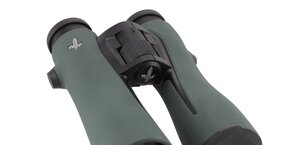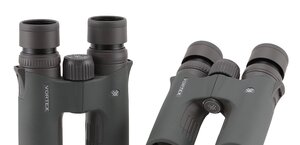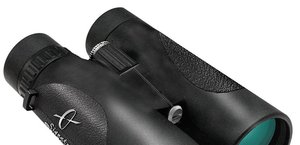| Real front lens diameter |
Left: 32.1+/-
0.05 mm
Right: 32.13+/-
0.05 mm
|
8 / 8.0 pkt |
| Real magnification |
8.04+/-
0.05x
|
3/3.0 |
| Transmission |
84.6+/-
1%
|
12/25.0 |
| Chromatic aberration |
Noticeable in the centre, slightly higher than medium on the edge. |
4.7/10.0 |
| Astigmatism |
Distinct. Stars are sparkling a bit. |
4.8/10.0 |
| Distortion |
Distance of the first curved line from the field of view centre compared to the field of view radius: 46% ± 4% |
5/10.0 |
| Coma |
Starts in a distance of 60% of the field of view radius and is high on the very edge. |
4/10.0 |
| Blurring at the edge of the FOV |
Blur occurs in a distance of 69% ± 3% from the field of view centre. |
3/10.0 |
| Darkening at the edge the FOV |
Level a bit lower than medium. |
3/5.0 |
| Whiteness of the image |
Noticeable dip in the transmission curve in the middle of visible spectrum. Similar transmission levels for red and blue. |
4.1/5.0 |
| Collimation |
Excellent. |
5/5.0 |
| Internal reflections |
| Left: |
Right:
|
 |
 |
A lot of lighter areas near the exit pupil. When you look at lampposts at night you can notice halo effect, spikes and 'ghosts' that change their positions when moving the binoculars. |
2.8/5.0 |
| Housing |
Very nice, shapely, stylish, and handy even for the 8x32 class. Rubber armour of good quality sticks to your hands properly well. The rubber covering the body fits tight but you can pull it away slightly on objective lenses. Confortable to handle with thumb indents that ensure you a firmer grip; also a joy to look through. No shoddy workmanship. Rubberized eyecups with three regulation positions. Manufactured in China.
|
7.5/8.0 |
| Focusing |
A big, ribbed central wheel which moves smoothly but is well damped. The full range needs a turn through an angle of 590 degrees. Dioptre correction done by a ribbed ring on the right eyepiece which is relatively big, comfortable to use. It also performs as it should but it moves the outer element.
|
4.5/5.0 |
| Tripod |
There is a quite comfortable access. In the 8x32 test all binoculars got in this category 1.5 points because tripod exit in this class of equippment is rarely used. |
1.5/3.0 |
| Interpupilary distance |
from 56.3 to 74.4mm
|
5/6.0 |
| Closest focusing distance |
1.4 meters. |
2/2.0 |
| Eyepieces FOV |
Apparent field of view of 65.8 deg (according to simple formula) and 59.9 deg (according to tangent formula). |
14/20.0 |
| Field of view |
Measured by us amounted to 8.19 ± 0.04 degrees and it was a tad larger than stated in official specifications. A wide field for this class of equipment. |
7/8.0 |
| Quality of the interior of the barrels |
Inner tubes are gray, not blackened very well. Gray, quite matt bottom but once again more black paint would be very welcome. Few ribs and some specks of dust.
|
2.8/5.0 |
| Vignetting |
| Left: |
Right:
|
 |
 |
OL: 0.90%, OR: 0.89% |
7/8.0 |
| Prisms quality |
Good quality BaK-4. |
8/8.0 |
| Antireflection coatings |
Different shades of green on objective lenses and prisms, green-light purple eyepieces. Medium intensity. |
4.5/5.0 |
| Warranty [years] |
lifetime |
6/6.0 |
| Final result |
68%
|
129.2 / 190 pkt
|
| Econo result |
|
0pkt. |
Summary
Pros:
- solid, very nice, and ergonomic casing made of magnesium composites,
- wide field of view,
- sensible colour reindition,
- clean optics inside the tubes,
- good quality prisms made of BaK-4 glass,
- round exit pupils,
- sharp images already from 1.4 metres,
- lifetime warranty.
Cons:
- visible chromatic aberration on the edge of the field of view,
- significant blurry area on the edge of the field of view,
- blackenning inside the tubes could have been better.
I have to admit the Vortex Diamondback HD 8x32 grabbed my attention the very moment it was launched. Why? It was very nice to look at, stylish and handy. It weighed just 450 grams (and in reality our measurement showed even less, 442 grams), featured a wide field of view and its price was set at a very sensible level, that of about 200 Euro.

Delta Optical Chase 8x42 ED and Vortex Diamondback 8x32 HD. |
There was another important factor. In the 42 mm class Diamondback HD devices faced a fierce competition in a form of very well-put-together Delta Optical Chase, Bushnell Nitro, Bushnell Forge, Olympus PRO and several series of Nikon devices. In the 8x32 class there are not so many competitors and the choice is not so rich. If you are interested in a small, lightweight, and handy pair of binoculars you have to look for something more expensive, like the Nikon Monarch 7 or the Kowa BDII. Even if you find something at the same price point as the tested binoculars, e.g. the Nikon Prostaff 7s 8x30, it usually features a narrow field of view.

Vortex Diamondback 8x32 HD, Vortex Viper 8x42 HD and Vortex Viper 10x50 HD. |
When it comes to optics, no surprises here – it's a level well-known from 42 mm class models, without fireworks but also without any major slip-ups. You would be foolish to expect much more with such a price tag and without low dispersion glass in the objective lens.
As it is, for slightly over 200 Euro you get a nice, solid, shapely pair of binoculars that doesn't weigh a lot and will be a good companion on different walks, excursions, and nature watching trips. The optics is really decent and the parameters - in full accordance with the official specifications, a real asset especially in case of the wide field of view. This piece of equipment is, in our opinion, perfectly recommendable and it fits this particular market gap quite well.






















